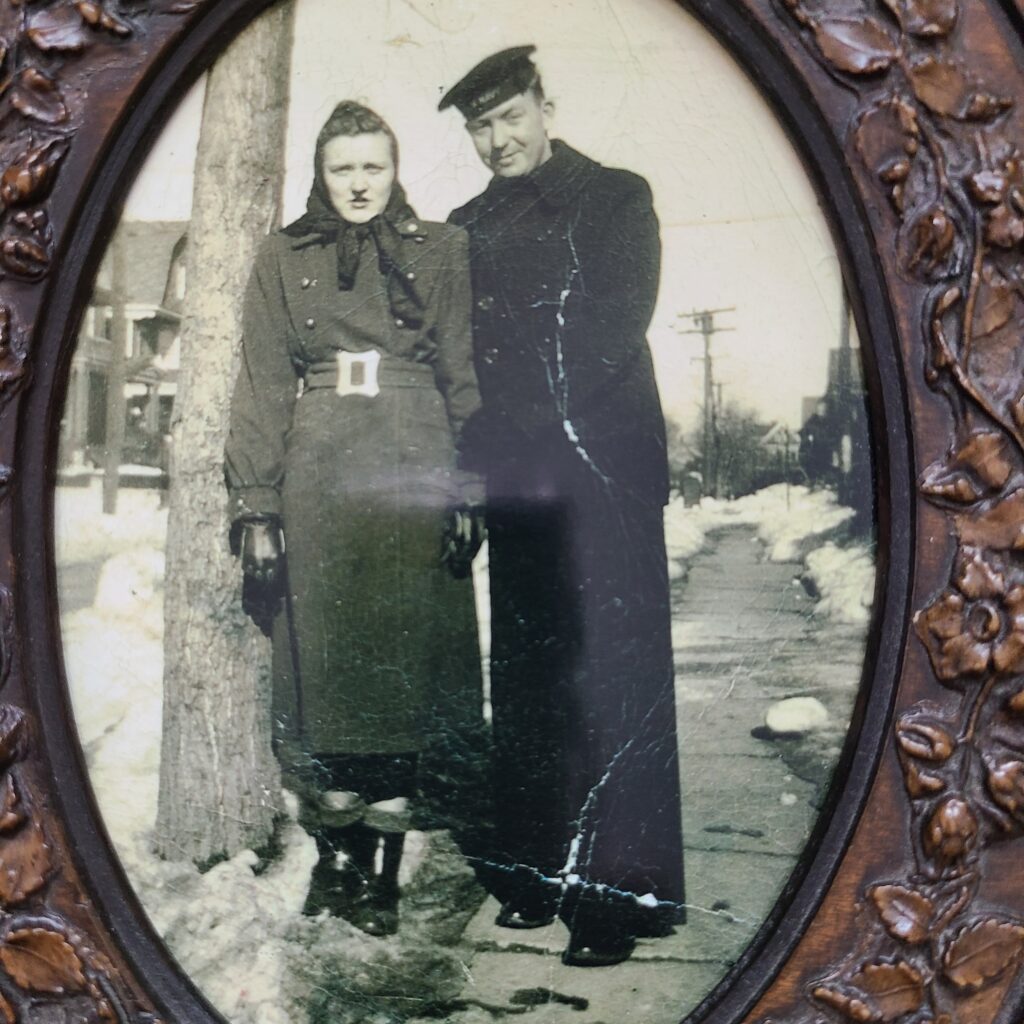
Seventy-seven years ago, today, the woman who would become my mother, Gertrude Agnes Theresa Dwyer, and the man who would become my father, Giles Jesse Adams, boarded a Greyhound Bus in Boston, along with two of their friends, and headed to Seabrook, New Hampshire.
She was 18; he was 20.
Their mission: Marriage, just over the border from Massachusetts, where the age of marriage was 21, unless the woman’s parents would sign for her. In New Hampshire, a woman could be married at the age of 18, without parental consent.
Gert lived with her old-fashioned, strict, curmudgeon of a father. He would never have approved of this marriage. After all, Giles was a southerner, in the Navy, seemed to have no future, and, above all, wasn’t of Irish descent. (Little did he know that Ancestry.com would prove otherwise, many years later.) Gert and Giles had been dating clandestinely for a while, going dancing, at a local bar called the Hillbilly Ranch. My grandpa would have stifled that relationship if he had only known.
The foursome–Giles, Gert, her friend Joyce, and an unknown friend of his–got off the bus, headed for Seabrook City Hall, where Gert and Giles were married by the Justice of the Peace. They returned to the Greyhound terminal and took the next bus back to Boston. She went home to her father’s house, while he went back to his ship in Boston harbor.
That was their wedding day. And night.
She never told her father on that day that she’d been married. They didn’t have enough money to buy rings, so she wasn’t wearing one.
Who knows what happened when he returned to his ship? I have no documentation on that.
It wasn’t until his ship was sent to Newport News about six months later that she had to tell her father. My grandfather had a huge Irish temper (he was a Boston firefighter), and he essentially then threw her out of the house. She was the youngest of his four children. Her oldest brother had joined the Navy to get out of the house, her oldest sister had joined the WAVES (the women’s Navy), also to get out of their father’s house), and her next older sister had married young to get away from their father. Their mother had been committed to a state mental institution when Gert was twelve years old. She had no allies left.
She packed one suitcase, wrapped a kerchief across her neck, and, crying all the way, took what little money she had, headed for the same Greyhound station that had taken her to Seabrook. This time, she was headed south. Destination: Hiltons, Virginia, where Giles had been raised.
First, New York City’s Port Authority. Then, changing buses, she boarded one to Washington, DC. Remember, this was 1947, and women traveling alone was the exception rather than the rule. She clutched her suitcase on her lap so that no one could steal her meager possessions.
Then another bus,. This one took her across the Commonwealth of Virginia, through small towns she’d never heard of, some of which had been the site of Civil War battles. But she didn’t know that. She just saw the town names. Whytheville. Roanoke. Petersburg. Bristol. Then she got off in Kingsport, Tennessee. Her new brother-in-law as waiting for her.
Now, Giles’s mother (my grandmother), his sister, and his niece had in mind that they were going to make Gert into a good farm wife by teaching her to can peaches, slop hogs, quilt blankets, plant and weed a garden, those kinds of things. Gert wanted to find a job somewhere–anywhere–not knowing that there was no public transportation available, not to mention that this house was in the middle of nowhere. Nowhere. Literally. No other houses in sight. For miles. And she didn’t;t know how to drive.
To them she was a stubborn woman whose Boston accent wasn’t understandable. To her, they were a bunch of hicks who wouldn’t understand what it was like to live in a sophisticated place like Boston. Side note: My grandmother and aunt didn’t have indoor plumbing until I was sixteen, in 1964.
It wasn’t a good fit.
Giles promised he would come home on leave whenever he had a three-day weekend. His only transportation was a 1947 Indian motorcycle. Newport News was about five-hundred miles away. This was before the interstate highway system was in place. Five-hundred miles then wasn’t like five-hundred miles now. They would have, maybe twelve hours together when he came home. His mother, father, sister, and other people in town had demands on his time as well.
Sometimes she felt as if she was way down on his priorities list.
When my mother died, I discovered this story in a box that contained some of her writings. She had dropped out of high school in the tenth grade (the same high school, by the way, from which Whitey Bulger dropped out), so her writing wasn’t always clear. But the story of her elopement and bus trip was fascinating to me.
The two of them only lived to celebrate their fortieth anniversary together, in 1987. My father was seriously ill with prostate cancer, and he passed away in August of that year. But they made it for four decades. It wasn’t exactly roses, but they did it. Somehow. Some way.
I couldn’t let this day go by without acknowledging their unusual beginning. Happy anniversary, Ma and Dad.


0 Comments